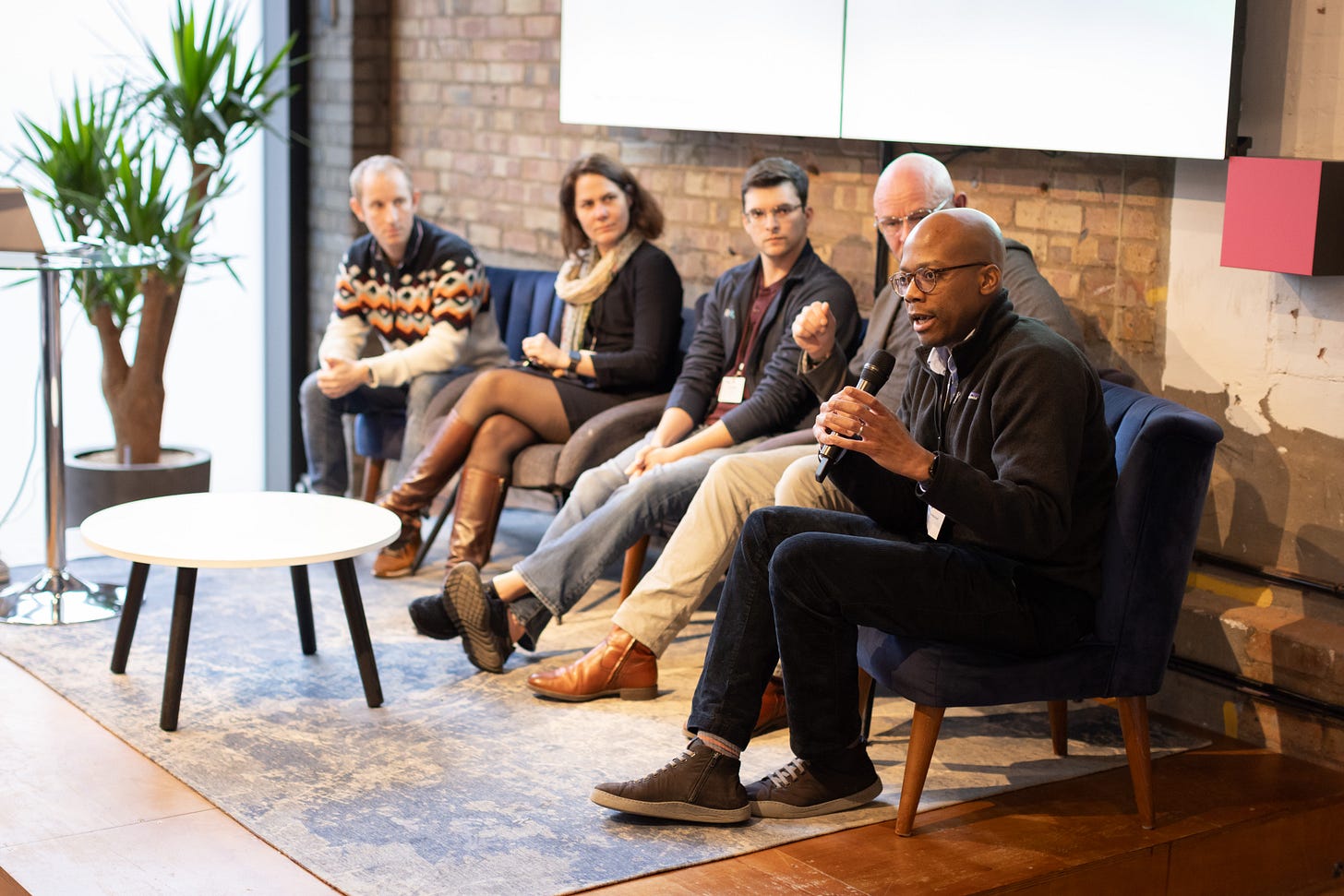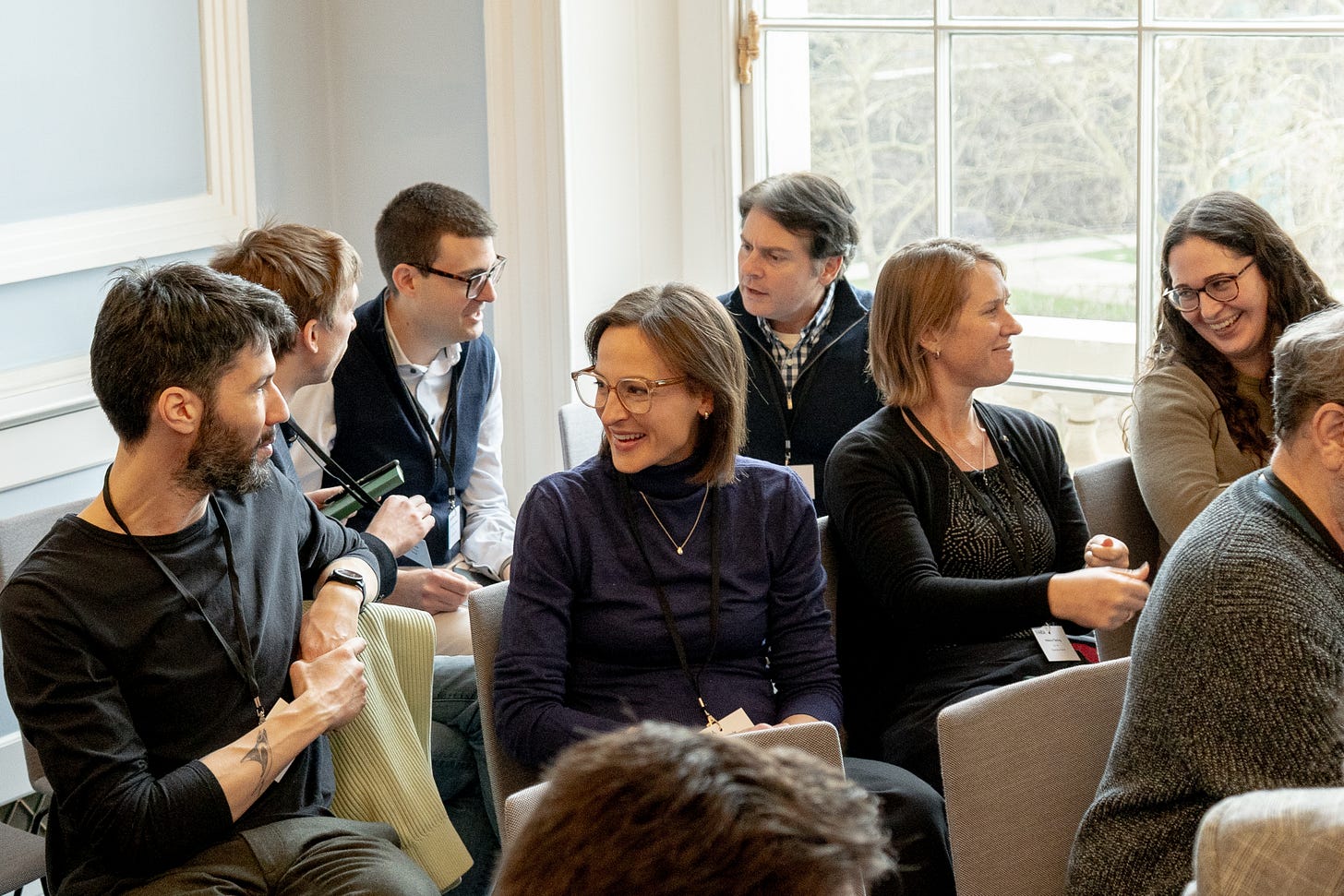Discovery, connection, creation: inside our workshops
“We’re not just funding research; we’re funding a community": this month, we dig into our workshops where researchers refine ideas, forge new collaborations, and unite around goals.
What’s new at ARIA
We’ve funded 27 teams in our Forecasting Tipping Points programme. They’re working on an early warning system for climate tipping points, whether that’s developing new sensing systems, or unlocking the mathematical, physical, and computational methods necessary to characterise tipping point dynamics. Read more about these projects on our website and in The Guardian.
We’ve announced the first 10 teams in our Robot Dexterity programme. These teams will focus on accelerating the development of robot hardware to improve their skills and dexterity, ultimately creating vastly more useful machines. Read more about the projects here.
Funding opportunities are open for TA1 in Safeguarded AI. We’re looking for teams of software developers to build an extendable, interoperable language and platform to maintain formal world models and specifications. Submit your full proposal for TA 1.2 and TA 1.3 by 9 April.
Funding for benchmarking is open in Scaling Compute. As Programme Director Suraj Bramhavar noted in our previous update, this team will track progress against rapid advances in the field, creating an accurate (and open) source of truth for the programme’s targets. Submit your application by 10 March.
Pillar VC’s fellowship launches soon. Our Activation Partner Pillar VC is launching Encode, a new fellowship for AI researchers to accelerate breakthroughs across our opportunity spaces. Applications open on 20 March.
Building on last month’s Women in AI Breakfasts, Pillar VC has run a series of evening discussions on AI in Science. Sign up for their upcoming event in Edinburgh on 13 March here.
Join Nucleate UK for an evening dedicated to growing the sustainability ecosystem. Register for the 17 March meet-up here.
Convergent Research is seeking FRO proposals for the UK. Submit your full proposal by 28 March.
Our CEO sat down with Laura Kuenssberg. Ilan joined Laura to discuss how ARIA is unlocking breakthroughs to fuel the UK’s next trillion-pound industries. Watch the interview here.
Inside an ARIA workshop
"Raise your hand if you know half the people in this room." Of thirty people, a single hand goes up. "How about if you know fewer than seven people?" Almost every hand shoots up.
This scene at an ARIA workshop on Programmable Plants didn’t happen by chance. “Our workshops are deliberately designed to unlock the siloes in science and bring together experts who wouldn’t otherwise meet,” explains Muji Ahmedi, Product Operations Lead. As part of ARIA’s Product team, he develops the operational mechanisms that enable our PDs to drive scientific and technological breakthroughs – including designing these workshops. “The sparks fly when workshop participants realise how much their work interrelates, and that’s where the real innovation happens.”
Breakthroughs often come from unexpected interactions – Tim Berners-Lee, a computer scientist, built the Web at CERN, to meet the collaboration needs of the particle physics community. Watson and Crick uncovered DNA’s double-helix structure, building on Rosalind Franklin’s crucial X-ray diffraction data. Karikó and Weissman unlocked mRNA’s potential by bridging biochemistry and immunology. Too often, these moments happen unpredictably. At ARIA, we’re designing for them.
Our workshops play a key role – breaking down siloes, forging connections, and unlocking new ideas that wouldn’t emerge in isolation.
We run two distinct types of workshops: discovery workshops that shape initial programme theses, and Creator workshops that forge connections between funded teams and align projects towards the bold goals.
“[The workshop] genuinely strengthened the programme.”
Discovery workshops serve as crucial testing grounds for refining ideas and assessing what is critical for a programme. For Programme Director Jenny Read, this was a pivotal moment.
“The in-person workshop was the most stressful part of the programme development process,” she reflects. “I’d published my programme thesis and was now asking 200 people to challenge it. I worried whether it was compelling enough to justify their time – but in the end, it was energising. It brought together many future applicants and genuinely strengthened the programme.”
Following visits to robotics hubs around the UK and insights from this workshop, Jenny placed greater emphasis on integrating hardware and software – a shift that became the foundation of the Robot Dexterity programme as a whole.
Creator workshops, meanwhile, offer a chance to build connections and community among ARIA funded teams and align diverse projects towards common goals. Take Scaling Compute: its teams are all working toward one ambitious goal – reducing the hardware costs required to train large AI models by over 1000x. As DeepSeek’s advances showed that the field was evolving even faster than expected, the Programme team and Creators came together to evaluate the programme’s goalposts. ARIA is now onboarding a team to track these moving targets and publish findings to the research community.
“Once people are in a room together you see commonalities and shared challenges that you wouldn't initially expect.”
Even ARIA’s opportunity seed teams – who work more independently – experience this dynamic. When the Scoping Our Planet seed teams met in Oxford, a common thread quickly emerged. “We're funding a really diverse group of projects within the opportunity space, and once people are in a room together you see commonalities and shared challenges that you wouldn't initially expect,” said Dan Giles, Technical Specialist. “It was really exciting to see.”
Workshops don't just introduce people, they create the conditions for entirely new outcomes to emerge.
In one case, the six teams working on Technical Area 3 of our Precision Neurotechnologies programme agreed to co-author a white paper on the future implementation of neurotech in clinical practice. The idea was sparked by hearing the different aspects of each other’s work at the recent programme workshop, where they’d met for the first time.
Or take Stefano Gogioso and Mirco Giacobbe, who met at a Safeguarded AI workshop. That meeting didn’t just spark an idea – it sparked a brand new project, 'Hyper-optimised Tensor Contraction for Neural Networks Verification', which is now ARIA-funded.
"Having the right people in the right room will always lead to something interesting. But creating a shared identity and mission amplifies their impact," explains Muji. “We’re not just funding research; we’re funding a community.”





I am writing to express my deep concern and to raise an urgent objection to any and all plans involving geoengineering activities—including, but not limited to, solar radiation management (SRM) or stratospheric aerosol injection—being considered or conducted anywhere in the world.
Proposals to “dim the sun” by releasing particles into the atmosphere, without public consultation, parliamentary debate, or a scientific consensus on safety, represent not only a serious environmental risk but also a direct threat to public health, agricultural stability, and fundamental human rights.
We, the people, are not experimental subjects. We do not consent to being exposed—without choice or full disclosure—to unregulated substances such as graphene oxide, barium, strontium, aluminium, or other unidentified agents suspected to be present in ongoing atmospheric aerosol programs. There are increasing reports and whistleblower accounts suggesting links between these activities and environmental degradation, respiratory illness, and crop disruption.
Such actions threaten our ecosystems and national sovereignty and may constitute violations of the following legal and ethical frameworks (among others):
The Nuremberg Code (1947) — Prohibits experimentation on humans without voluntary, informed consent.
The Human Rights Act 1998 — Protects the right to life (Article 2), the right to private and family life (Article 8, and the right to be free from inhuman or degrading treatment (Article 3).
The Environmental Protection Act 1990 — Mandates control of pollution and proper assessment of substances released into the environment.
The Aarhus Convention (ratified by the UK) — Ensures public rights to access environmental information, participate in decision-making, and seek justice in environmental matters.
It is wholly unacceptable to move forward with any form of climate manipulation or atmospheric experimentation without transparent scientific evidence, democratic oversight, and informed public consent. History has shown that governments may permit such acts, only to later disavow them and prosecute those responsible. No one is above accountability.
Therefore, I call for:
An immediate ban on all geoengineering and solar radiation management (SRM) trials over all airspace.
A full, independent investigation into aerial aerosol activities and their potential impact on public health and the environment.
Full disclosure of any agreements, funding arrangements, or involvement in international climate intervention programs.
This is not responsible climate policy—it is unregulated environmental experimentation with potentially irreversible consequences.
You will be held accountable. You will be held liable.
We demand an immediate and permanent ban on all environmental and biological tampering activities.
I urge you to act now to halt these practices before irreversible harm is done.